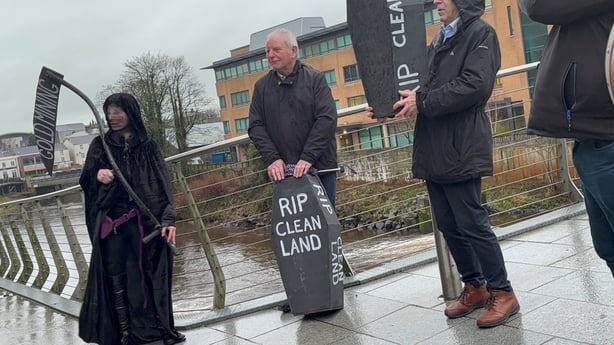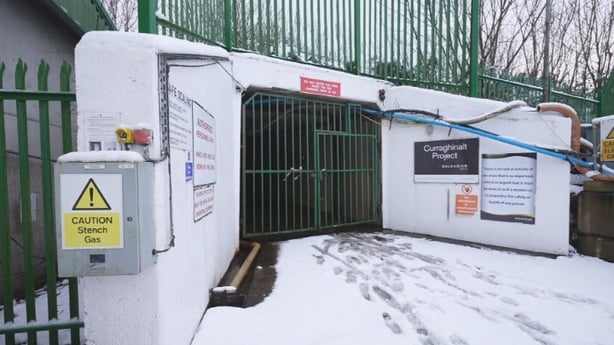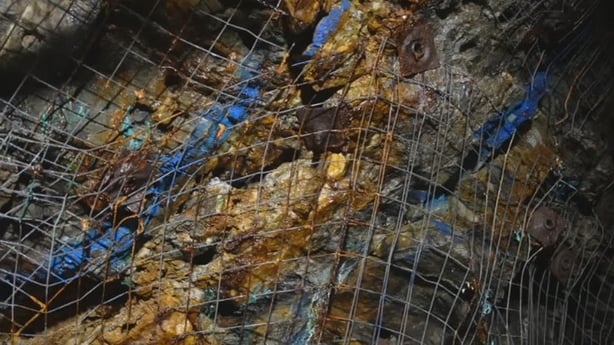A long-awaited public inquiry into a hugely controversial plan for a large underground goldmine in Co Tyrone began to unravel shortly after a brown envelope was left on the top table shortly before it began.
Inquiry chairperson Jacqueline McParland was not amused when she found the unsolicited envelope beside her microphone when she took her seat.
When she asked who left it, up went the hand of a man who introduced himself as Gerard Moyne from Co Donegal.
He apologised for the unusual step, but said he had no alternative option because he and the other residents of his home county had been denied their legal right to have a say.
Mr Moyne explained that the envelope contained a submission from Defending Environmental Wealth, a Donegal-based environmental consultancy.
The chairperson looked a little perplexed, as well as unamused, explaining that this was not in line with inquiry procedures.
The envelope was later returned to its owner, who was told it could not be entered as evidence to the inquiry in that way.
In the end that didn't matter as the submission highlighted an issue that blew the inquiry out of the water, at least for now.
It all comes down to what are called "transboundary issues", the possible impact the goldmine could have on cross-border waterways including the River Finn which runs along the borders of counties Tyrone and Donegal and the River Foyle and Foyle Basin in Derry.

There are many other objections by environmentalists, but it was the issue of water that sank the inquiry last week.
"The environment and our rivers don't care about the border," said an expert witness brought in by Save Our Sperrins, a campaign group set up to oppose the plan.
When a man called James Marshall found flecks of gold in a river in California in 1848, it sparked the famous American gold rush which attracted prospectors from across the globe.
American-owned mining company Dalradian claims its extensive testing has established that Northern Ireland contains the seventh richest deposits of gold anywhere in the world.
"Our testing reveals an unusually rich deposit averaging 13.5 grams of gold per tonne of rock, which is more than five times the global average for gold mines," it says.
It has applied for planning permission to build a large underground mine in the heart of the Sperrin Mountains, around 19 kilometres from the town of Omagh.
It is a protected designated Area of Outstanding Natural Beauty.

The company says the mine would be operational 365 days a year for up to 25 years.
It has applied to extract 3.5 million ounces of gold, 850,000 ounces of silver, 15,000 tonnes of copper, and large quantities of other precious minerals.
The company has said the mine will create 350 full-time, well paid jobs, quoting an average of £45,000, well above the Northern Ireland average wage of of £34,400.
It also insists that it will protect the local environment and points to the abandonment of a plan to use cyanide in the extraction process as proof of that commitment.
Opponents claim the mine will be an environmental disaster that will cause irreversible damage.
While James Marshall triggered a scramble for gold in California, Dalradian triggered an avalanche of opposition with several campaign groups established to oppose their plans, as well as many committed individuals.
Tensions are high. At the opening of the inquiry on Monday all of those attending were instructed to turn off their mobile phones and warned not to take photographs or record proceedings.
Some of those who spoke at pre-inquiry hearings complained that footage had been shared on social media and used to intimidate and bully them.
The issue of transboundary impacts was the subject of much heated debate last week.
The unsolicited and seemingly unread submission from Defending Environmental Wealth pointed out that the European Espoo Convention requires the state in which an activity that may have an environmental impact "to examine its environmental impacts on other states (affected parties)".
That means the so-called origin state, the government of Northern Ireland, had a legal duty to inform the Irish Government and others like Donegal County Council about the application and its potential impacts, and to give them sufficient time for consultation and to submit comments.
It was two nationalist ministers who failed to instruct their officials to do so.
The inquiry was ordered more than four years ago by the then minister for the Department for Infrastructure at Stormont, Nichola Mallon of the SDLP.
Her successor, and the current minister, is John O'Dowd of Sinn Féin.
It is no doubt embarrassing that a party that has put Irish unity front and centre of its political priorities has failed to adhere to a legal requirement to consult with the Irish authorities.
A barrister for the department was unambiguous when asked about the issue on Wednesday.
David Elvin said the fact that it had breached its own regulations "is not in dispute".
While the people of Co Tyrone were invited to contribute to the inquiry more than four years ago, the people of Donegal were given just over four weeks notice and the information was not shared widely.

There was no formal consultation at all with the Irish Environmental Protection Agency.
Having initially insisted that the oversight should not delay the inquiry, urging the chairperson "not to throw the bay out with the bathwater," Mr Elvin later raised the white flag.
"The view of the department is that it should formally notify and consult the Dublin government and re-consult Donegal County Council with the appropriate links and references to the documentation to ensure that the relevant material is brought before them and before the residents of Donegal particularly," he said on Wednesday afternoon.
Chairperson Jacqueline McParland referred him to Section 2 of the Northern Ireland Planning Act, which requires the department to produce a statement of community involvement and why it proposes to involve the community in planning matters.
Sean Gallagher, also of Defending Environmental Wealth, stressed that there had been "absolutely no consultation" with the people of Donegal.
"We're talking about fair procedure, we're talking about natural justice," he said. "There's no fair procedure here."
Others warmed to the theme.
"I would urge the commission to take the view that we cannot proceed, and to do so would be completely contrary to the legislation and contrary to natural justice," said Mary Brolly, a solicitor for Save Our Sperrins.
At one point the mic was handed to a man who introduced himself as David Simpson from Donegal.
He spoke of the right of the Irish Government to be involved in all aspects of the discussion and decision making process.
Then he hurled another big spanner into the water works.
"Because it's transboundary, it's transboundary with Ireland and Ireland is part of the EU," he pointed out.
"So that then brings into track European legislation and law so it's not a simple matter of just sending it to Donegal County Council. This is about another government, another state."
The shadow of Brexit was in the room.
Wednesday was supposed to be the third of 21 days of hearings spread across three months, but it was clear to everyone in the room long before she said it that chairperson was going to have to press pause.
When she did, Jacqueline McParland took aim at Stormont's Department for Infrastructure.
It was "deeply regrettable" she said that the inquiry panel had been put in this position "by the inaction of Stormont departments" and "their failure to follow their own legislative procedures".
She suspended it until 26 March at the earliest, when a "mid-inquiry" will be held if the panel receives all the information and submissions it requires on transboundary issues by 11 March.
It could be some time yet before the outcome of this bitter dispute finally pans out.







